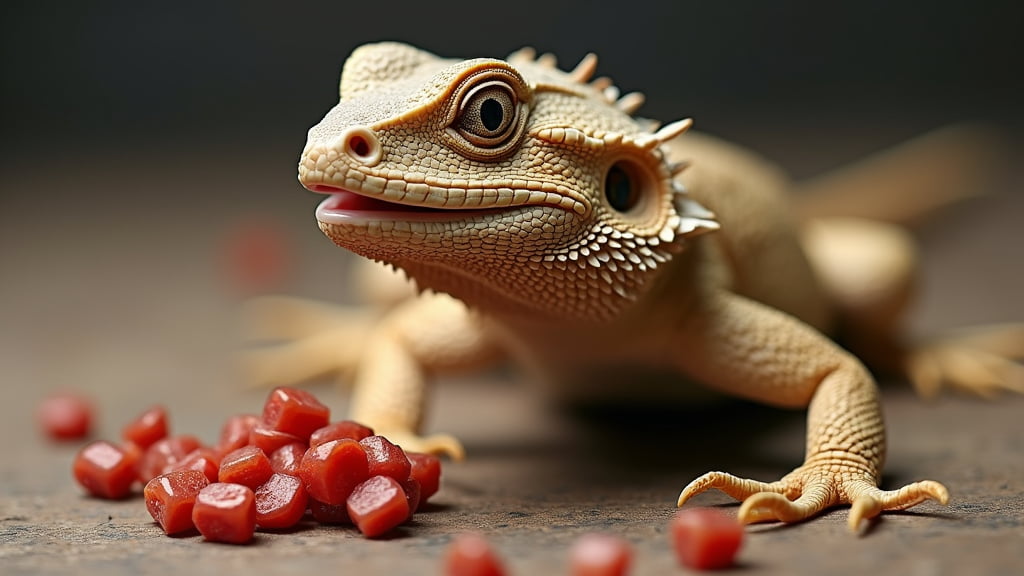Introduction
Bearded dragons are one of the most popular reptile pets, known not only for their docile nature but also for their intriguing feeding behaviour. As an exotic pet enthusiast, I’ve had the joy of observing these fascinating creatures up close for many years. In this post, we’ll delve into the captivating world of bearded dragon feeding behaviour, offering practical advice and expert insights to help you better understand and care for your scaly friend.
The Natural Diet of Bearded Dragons
Omnivorous Appetite
Bearded dragons are naturally omnivorous, meaning their diet includes both plant and animal matter. In the wild, they are opportunistic feeders, consuming what’s available in their environment. This includes a mix of insects, small mammals, and a variety of vegetation. Mimicking this diverse diet in captivity is crucial for their health and wellbeing.
Insects and Protein Sources
When it comes to protein, bearded dragons primarily feast on insects. Here are some of their favourites:
- Crickets: These are a staple in a bearded dragon’s diet. They are high in protein and easy to digest.
- Dubia Roaches: These are rich in nutrients and more substantial than crickets, making them an excellent choice.
- Mealworms and Superworms: These can be given as occasional treats but should not be a primary food source due to their high fat content.
Feeding Tips for Insects
Keep the following in mind:
- Always choose appropriately sized insects relative to your dragon’s size.
- Gut-load insects 24 hours before feeding your dragon to enhance their nutritional value.
- Dust insects with a calcium supplement to prevent metabolic bone disease.
Vegetables and Greens
A significant portion of a bearded dragon’s diet should consist of vegetables and greens. These provide essential vitamins and trace minerals. Some of the best choices include:
- Collard Greens: High in calcium and low in oxalates.
- Mustard Greens: Packed with nutrients and also a favourite among dragons.
- Butternut Squash: Offers a good source of fibre and vitamin A.
Preparing Vegetables
Make sure to:
- Wash all vegetables thoroughly.
- Cut them into bite-sized pieces.
- Offer a variety every day to ensure a balanced diet.
Feeding Routines and Habits
Meal Frequency
The feeding routine of a bearded dragon varies depending on its age:
- Hatchlings (0-6 months): Feed them 3 times a day with a heavy focus on protein to support rapid growth.
- Juveniles (6-12 months): Reduce to 2 daily feedings, incorporating more vegetables.
- Adults (12 months+): One meal per day is sufficient, with a diet that’s about 80% vegetables and 20% protein.
Observing Feeding Behaviour
Bearded dragons have individual feeding preferences and behaviours. Some common observations include:
- Enthusiastic Feeders: These dragons readily accept food, often displaying a keen hunting instinct when chasing insects.
- Picky Eaters: Some dragons are selective, preferring certain foods over others. Keeping track of their preferences can help customize their diet.
- Feeding Hibernation: During cooler months, some dragons may slow their feeding and enter a state called brumation, similar to hibernation.
Health and Nutritional Considerations
Hydration
Hydration is as crucial as a balanced diet. Bearded dragons typically do not drink from standing water but absorb moisture from their food and environment. To ensure they stay hydrated:
- Mist vegetables lightly before serving.
- Offer water by dripping it on their snout or using a shallow dish.
Signs of Nutritional Deficiencies
Keeping a watchful eye on your bearded dragon’s diet can help prevent health issues. Some signs of nutritional deficiencies include:
- Weakness or lethargy: Potentially indicating a lack of essential nutrients.
- Deformed bones or swollen joints: These could be symptoms of metabolic bone disease due to insufficient calcium.
In case of any signs of ill health, it’s imperative to consult a vet who specialises in reptiles.
Conclusion
Understanding the feeding behaviour of bearded dragons is key to their health and wellbeing. By providing a varied diet that mimics their natural eating habits, you can ensure your dragon lives a long, happy life. Remember to adjust their diet as they age and be mindful of their individual preferences and behaviours.
For further reading, you can visit our detailed guide on Bearded Dragon Care.
Are you passionate about bearded dragons? Share your experiences or questions in the comments below!
—
Internal Links:
- Bearded Dragon Care
- Common Health Issues in Bearded Dragons
External Links:
SEO Optimisation:
- Primary keyword: Bearded dragon feeding behaviour
- Long-tail keywords: natural diet of bearded dragons, signs of nutritional deficiencies in bearded dragons, feeding routines for bearded dragons
—
Summary: This engaging and well-structured blog post provides comprehensive information on the feeding behaviour of bearded dragons. With a focus on both diet specifics and feeding routines, it offers practical advice backed by personal experience, ensuring a valuable read for bearded dragon owners.

